The first book I read in the 39 years of this series was a genre thriller, and I've read only two more since. The second one came along this year. In 1989, I got a temporary job in the archives of the Royal Navy Submarine Museum where I met Carl Erlewyn-Lajeunesse, an anti-authoritarian Canadian Saul Bellow-lookalike with a conspiritorial laugh. Our job was to enter into a computer database the careers of submarine officers from 1901 up to and including the Second World War, researching the details in handwritten ledgers, small notecards and plump hardbacks called The Navy List. Carl decided that instead of merely entering dates, names of ships and boats (submarines are 'boats', never 'subs') we would write short narratives for each officer. I remember one early submariner who took his pet rat on patrol. It was called Ratto and lived up his sleeve. And I don't forget what happened to the crew of HMS C16 off Harwich in 1917. The boat became trapped on the seabed and an attempt was made to fire a crew member through the torpedo tube, with a note to rescuers tied to his body, but he got stuck and drowned. Then they tried to open the hatch, which wouldn't open fully but then wouldn't close, making escape impossible. The boat began to fill up. One crew member left a note to his family asking them to inform "my girl" of his fate and ended with the words "thought of you till last moments".
Perhaps to counter the darkness of such stories, Carl also decided we should insert a fake career into the database. We had great fun inventing the details. His name was
Rear-Admiral Sir Geraint Fairbairn-Bentinck, a bachelor sailor who liked especially to
mentor handsome young midshipmen and was renowned for his prolific torpedoing of merchant ships – a feat distinguished because it was done
completely outside of wartime. By astonishing coincidence, each ship happened to be carrying the cargo of competitors to the family business.
It turned out that Carl had published a crime thriller in 1981. He also wrote issues of a comic called Commando (I found this page only yesterday searching for photos of the novel), and he knew what he was writing about as he'd served as a paratrooper in the Korean War, later half-seriously expressing regret that he hadn't fought on the North Korean side. He didn't have a copy of Dead Man Running, as he had lent his last copy to someone many years previously and they hadn't returned it. With remarkable good fortune, I found a copy for sale in the local library. I read it and then presented it to him on his birthday. Many years later it was displayed at his wake.
I owe Carl a great deal. He encouraged me to work towards a place at university, something that at the time was as remote to me as walking on the moon. Nobody in my large extended family had ever been to one. Chance meetings that change the course of a life become clearer with age, and more vertiginous.


I loved this anecdotal post
ReplyDeleteThanks. And now I know your name!
ReplyDelete